
views
What is social etiquette?

Social etiquette refers to rules of how people are expected to behave. When you’re chatting with friends, family, coworkers, or anyone else, there are social norms people follow to help guide their interactions. When you stick to these norms and have good social etiquette, you show others that you’re a polite and respectful person, which could lead to building even stronger relationships with others. Social etiquette can vary between different social groups and cultures. For example, while it’s socially acceptable to goof around and make jokes when you’re hanging out with friends, use a more professional tone when you’re chatting with coworkers. Similarly, while shaking hands is a common custom in the U.S., it may be rude in other parts of the world.
Basic Social Etiquette
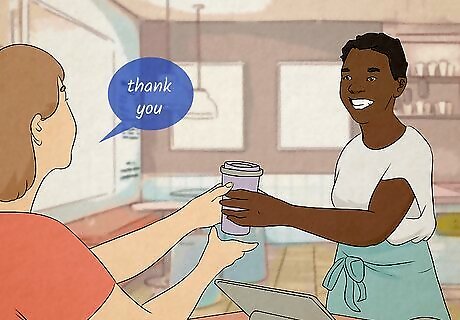
Say “please” and “thank you.” If you want to show that you have good manners, start every request with “please.” Whenever someone does something nice for you, thank them with genuinely to show that you notice and care about what they did.

Smile at people. Showing a genuine smile can help people feel like they can trust you more and makes you radiate positive energy. Even just flashing your smile as you pass people is the perfect act of common courtesy.
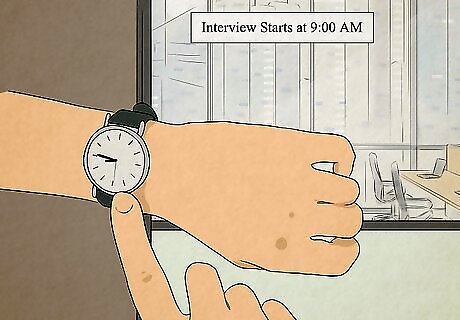
Be punctual. Showing up on time shows other people that you’re reliable and can be counted on. Try to get places on schedule to show that you respect other peoples’ time.
Maintain your personal hygiene. When you focus on your hygiene, it shows people that you put care and energy into how you present yourself. Follow some basic hygiene rules, like showering every day, wearing clean clothes, and cleaning up around you.
Dress appropriately for the occasion. Keep in mind where you’re going, and check if there’s a dress code so you know what to wear. At a formal event, dress up in a suit or wear a nice dress, but stick to clothes like T-shirts, button-ups, and jeans for something casual. Following the social norms for how you dress will show that you care about how you present yourself when you’re in public.
Keep a positive attitude. People feel much more comfortable spending time and chatting with you when you maintain a positive attitude. Smile, laugh, and highlight the best parts of your life so you avoid complaining or having a negative outlook.
Treat others how you want to be treated. If you want people to show you respect and make you feel comfortable in a social situation, then do the same for them. Use kind words in conversations and be generous to everyone you interact with, and they’ll return the favor. When you treat others fairly, it shows that you’re respectful and caring toward them.
Shake hands when you meet someone. Shaking hands is a mutual sign of respect when you’re greeting someone, and it makes a great first impression. Whether you’re in a formal or casual setting, offer a handshake as you introduce yourself to follow the social norm.
Hold the door open for other people. Holding the door open for someone shows that you’ve noticed them and makes you seem more helpful. When someone is only a few steps behind you, stay there to hold the door so it doesn’t close on them.
Go out of your way to help a person in need. If you see someone is visibly struggling with something, be polite and see if there’s a way you’re able to assist them. It may be as simple as grabbing something out of their reach or buying someone a meal. Not only will you feel good offering help, but the person will feel like you really respect and care for them.
Give other people their personal space. Everyone has a different level of personal space they need to feel comfortable, so be sure to leave around 2 feet (61 cm) of room between you and other people. When you give people space, it helps them feel like you’re respectful and not intrusive.
Excuse yourself if you bump into someone. Say “excuse me” if you accidentally run into someone so the person knows it wasn’t intentional. Even just saying it quickly in passing will make you sound more polite.
Conversational Etiquette

Introduce yourself to people you don’t know. Take the time to make introductions if you’re in a group with strangers so they feel more comfortable. They’ll appreciate that you’re taking the time to be friendly and respectfully including them.

Address people by their name or title. When you’re chatting with people, try to use their name or title as a sign of respect. When in doubt about what to call them, just ask the person you’re talking to how they’d like to be addressed.

Listen to others without interrupting them. Other people feel more respected when you’re actively listening and engaging with what they have to say. Be sure to give your full attention by looking at them while they speak and taking their words to heart so you can ask follow-up questions and keep the conversation going.
Maintain eye contact and open body language. When you make eye contact and use polite body language, people feel like you’re genuinely interested in the conversation. Lean in closer, keep your arms at your side, and nod along while they’re talking to show that you’re engaged.
Stop checking your phone while someone is talking. Put your phone on silent while you’re chatting. Your conversation partner will love that you’re giving them your full attention rather than getting distracted.
Take turns speaking in a conversation. Have better conversations by asking questions and letting the other person speak as much as you do. When you have a balanced conversation, it shows that you respect what the other person has to say and are eager to listen.
Speak at an appropriate volume. Speak more softly and develop a friendly tone to help your conversation feel more natural. Only raise your voice if you’re in a loud environment, like at a party or bar, so you’re able to hear each other.
Limit your use of hand gestures. While it's still okay to use some hand gestures effectively, avoid making wild hand movements every time you talk. When you keep your arms more relaxed during a conversation, it shows that you’re feeling relaxed and confident.
Avoid bringing up controversial topics. Avoid topics that cause conflict, like religion, politics, or money, in your friendly conversations so you don’t stir the pot. The people you’re talking with will appreciate that they can openly share their opinions without causing major disagreements.
Apologize if you say something that upsets another person. Admitting that you’ve done something wrong shows that you care about how you’ve wronged the other person. Make it a habit to sincerely apologize and say sorry for your actions.
Step away if you need to take a phone call. Find a quiet spot away from other people whenever there’s a call you need to answer. Stepping away shows that you respect the privacy of the person on the phone and don’t want to interrupt other conversations that are happening in person. If someone called while you were talking with someone, keep the phone call brief so you’re able to get back on track with the conversation.
Social Media Etiquette

Treat others as if you were seeing them face-to-face. It may be easier to say things you normally wouldn’t over text or on social media because you can’t see the other person you’re talking to. Avoid cyber-bullying and make sure you don’t tell them anything you wouldn’t say to their face.

Share only what you’d be comfortable showing future employers. Once you post something online, it’s difficult to get rid of and anyone could potentially see it. Before sharing anything to your profile, ask yourself if it could affect any future opportunities for you.

Double-check your spelling and grammar before sending messages. Right before you hit send, read through your message again to ensure it makes sense. If there are multiple mistakes in the message, correct them so the other person feels like you’re putting effort into the message and doesn’t get confused.
Steer clear of using sarcasm. Tone can be really tough to read over text, so someone could easily misunderstand sarcastic messages you send. To avoid sarcasm and confusion, stick to a polite and direct tone when you communicate over text or on social media.
Ask for permission before tagging people in posts. Before you post anything with other people in it, be sure they’re okay with it being online first. They’ll appreciate that you ran the post by them first so they don’t have something that’s embarrassing or inappropriate on their profile.
Take a break before responding to negative comments or emails. Responding when you’re feeling emotional or upset could make you say something you regret. Take a few minutes to step away and take a few deep breaths so you’re able to reply to rude comments with a level head.
Avoid spamming people with messages. Send a single message and wait for a reply before messaging again. Waiting for a reply makes the conversation feel more two-sided and balanced.
Accept friend requests only from people you know. People aren’t always who they say they are online, so avoid adding strangers as friends. That way, information on your profile stays private to the people that you trust.
Keep your personal information private. Sharing info like your phone number, address, or passwords can put your privacy (and accounts) at risk. Avoid oversharing on social media and maintain your privacy so your information doesn't get out.
Workplace Etiquette

Wear appropriate clothes for your company’s dress code. Follow the dress code at all times when you’re working so you’re taken seriously on the job. That way, your boss and coworkers know that you’re being respectful and following through with the social norms.

Keep your workspace neat and tidy. Clean up your desk and make sure it isn’t cluttered or spilling over into a coworker’s space. Maintaining the cleanliness of your workspace shows that you want to focus on the job and are respectful of others around you.
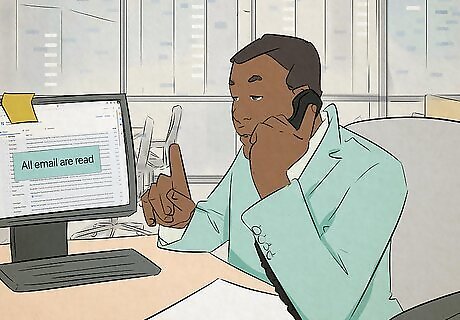
Respond to calls and emails as soon as possible. Responding in a timely manner shows that you respect the other person’s time, especially in a professional setting. Avoid waiting any longer than a day between responses to show that you’re prompt and reliable.
Use a professional tone in your work communications. Because you’re sending serious business emails or messages, try to limit any excessive formatting, punctuation, or emoticons. Write your emails with a formal tone so they’re taken seriously.
Stay home if you’re feeling sick. Even if you feel good enough to go to work, it’s inconsiderate to risk spreading the sickness to your coworkers. Call in sick and rest until you’re feeling healthy again.
Participate when you’re in a virtual meeting. If you’re working from home or have a video call with others, stay muted until it’s your turn to speak so you don't accidentally cut someone off. When there’s a talking point you want to touch on, actively participate in the discussion to show that you’re respectfully listening and engaging in the topic.
Respect your coworkers’ time and privacy. Always shoot your coworker a message or knock on their door to see if it’s a good time to talk. They’ll really appreciate that you’re putting their needs first and not interrupting their busy work day.
Limit chatting about personal topics. Keep unrelated personal conversations quick and try to talk about work-related topics when you’re interacting with others. That way, you’ll show off your professional attitude and stay focused on your tasks without getting distracted. Remember that it’s okay to keep your personal life private if you don’t want to open up to a nosy coworker.
Steer clear of office gossip. Avoid getting involved in gossip and ignore any rumors you hear. When coworkers see that you’re not bad-mouthing or participating in gossip, they’ll see that you’re respectful of other peoples’ privacy and focused on getting your job done.
Follow through on work commitments. If you say you’re going to complete a task or have assignments to do, show that you’re trustworthy and responsible by finishing what you started. Be consistent and keep promises you make so coworkers see that you can handle all the responsibilities that you take on.
Leave smelly foods at home. When you pack a meal, stick to foods that won’t linger around after you finish eating them, like cold-cut sandwiches, chips, fruits, and veggies. Your coworkers will be happy that there aren’t any lingering odors left behind.
Table Etiquette
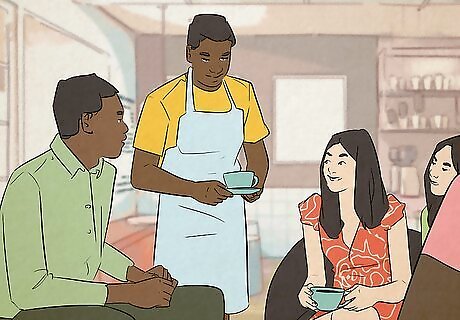
Wait for everyone to be served before eating. Even if you already have your food, have good table manners and be patient until other people are served too. That way, you all can enjoy your meal together rather than someone finishing early. If the person waiting for their food says that it’s okay to start eating without them, then it’s okay to dig in.
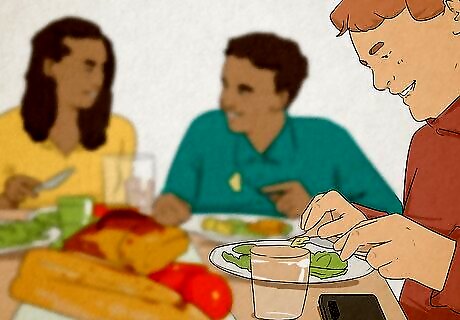
Put your phone away during mealtimes. If you’re eating with other people, give them your full attention instead of checking your phone. They’ll appreciate that you’re staying engaged in the conversation and your time together.

Set your napkin in your lap. If you want to leave a good impression, use the napkin by laying it on your lap to catch any spills. If you ever need to clean up during a messy meal, dab your mouth with the corner of the napkin rather than wiping it.
Pass food around the table instead of reaching for it. As food comes around the table, keep passing it to the right until everyone has been served. People will appreciate that you politely asked for the food and didn’t lean into their personal space to get what you wanted.
Take small bites of food. Use a fork and knife to cut your food into manageable pieces. That way, people will think you’re taking your time to eat and savoring each bite.
Chew with your mouth closed. Keep your mouth closed so people don’t see the food or hear annoying chewing noises. If you’re having a conversation while you eat, finish chewing and swallow your food before you start talking.
Keep your elbows off the table while you’re eating. While it's okay to lean forward and rest your elbows when you’re chatting at the table, sit up whenever you pick up utensils to start eating. When you’re not eating or chatting, sit with your hands in your lap or rest your wrists on the edge of the table.
Wait to be excused from the table. Even if you’re finished eating, be polite and stay seated until the end of the meal when other people are finished eating.
Push in your chair when you leave the table. Push your chair in as close to the table as you can. This common courtesy makes the chair take up less space so other people can walk around the table easily.
Tip your servers. After your meal, leaving a tip shows your appreciation for all your server’s hard work. Give between a 15% tip for okay service, and 20% or more if your service was excellent.




















Comments
0 comment